Paul made a very, very important statement when he said, behold the goodness and the severity of God. Because if we don’t see both of those sides, people have a tendency to fall into the ditch. And there’s a ditch on both sides of the road. We have to be careful with that. We have to be doctrinally pure. Paul himself said, until the law came I knew no sin. So God brought [the Law] to show us right from wrong. The Law is not evil — it proved that we were!
—Dr. Douglas Bankson, Senior Pastor, Victory Church World outreach Center, Apopka, Florida, in the film Enemies Within the Church—
Key point: God’s love and His absolute holiness are intertwined, and to talk about His love without ever talking about His holiness and wrath is to misrepresent Him and to promote a warped, and ultimately false, view of Him. We also must remember that Thanksgiving isn’t just about what God has done for us, but also about who He is.
In May of 2017, I published an article titled “God Is Angry, And Here’s Why.” In it, my readers and I examined Psalm 19:1-4 and Romans 1:18-32. We explored the reality that an increasing number of people are rejecting, not only God’s offer of salvation, but also His self-evident “ground rules for life.” These “ground rules” are an integral part of God’s revelation through nature and His design for humanity. They include matters of sex, sex roles, relationships, and God’s essentially using nature to “introduce” Himself as Creator to everyone on earth.
Six months after publishing “God Is Angry, And Here’s Why,” I released an article that looked back on Martin Luther’s salvation experience and his discovery that “the just shall live by faith.” The title of that particular article is “Painting a Clear Picture of God: Lessons from the Protestant Reformation.”
In this post I’m going to quote extensively from the article about Luther. Today, in the early 21st century, the perception people have of God — and here I’m talking about people both inside and outside the church — is distorted. Yet it is essential for us to get an accurate picture of Him if we would have any hope of responding to Him as we should. The article focuses on a divine attribute that today we tend to ignore, but that benefited Luther immensely.

How, someone may ask, is our view of God lopsided or skewed? Here’s how: Generally speaking, today’s society and the modern evangelical church see God as loving but not harsh in any way. God is loving, but He also is harsh toward sin — and to unrepentant sinners. Martin Luther (1483-1546) also had a lopsided view of God, but he believed God was angry and “out to get him.” Indeed, God is angry, yet He also is loving. God’s love for people and His wrath against sin are intertwined.
Every good gift and every perfect gift is from above, and comes down from the Father of lights, with whom there is no variation or shadow of turning.
—James 1:17—

In our day, God is just like He was in Martin Luther’s day. The Lord has not changed, but culture’s perspective of God has changed, and, unfortunately, so has the church’s. This is not to say that the church in Martin Luther’s day was right about God, either; it is to say that today’s evangelical church, with its emphasis on the inerrancy of the Bible, has no excuse for having and presenting a distorted view of God.
Let’s put it another way. Whereas Martin Luther had to discover that God is loving, people today, including most Christians, need to realize (or realize anew) that God is righteous, utterly holy, and ultimately intolerant of sin and unrepentant sinners. Here is what I wrote in the Word Foundations post I released November 12, 2017:
[T]he American evangelical church today, as we indicated in items 6, 7, and 86 of our 95 Theses for the Protestant Evangelical Church in the 21st Century, tends to present a lopsided view of God.
-
-
-
- The church has emphasized God’s love to the point of effectively neglecting his holiness and wrath.
- The church says very little about hell, yet hell is very real.
- The church, through a variety of actions and inactions, promotes the idea that God can be approached in a thoroughly casual fashion. Note that this failure is not tied exclusively to music styles or lyrics.
-
-
In using the word casual in this last point, I am not at all arguing against the principle that sinners must come as they are to God, with all of their sin, and rely fully on Jesus’ death and the regenerating power of the Holy Spirit for cleansing. I am saying we must never take God’s grace for granted (see Isa. 1:18; John 3:5-8; 1 Tim. 2:5; Rom. 2:4; 1 Pet. 3:18).
Many people say, “God is a God of love who never would send anyone to hell.” Where have they gotten this idea? Ultimately, it is a lie from Satan, but regardless of the avenues through which Satan propagates this distortion, the church seems to make little or no effort to correct it, even among its own people. Yes, God is a God of love, but He also is a holy and just God who must punish sin (go here and here).
Bad News; Good News
Believers, both individually and corporately, need to present the truth about God’s love and holiness. Yet…we seem to have failed to understand that the good news of the gospel can be seen for how wonderful it is only against the backdrop of its bad news about sin, accountability to a holy God, and certain judgment. Again, God is holy and perfect, and He must judge sin. As we say in our presentation of how to become a Christian, “While we might not think of our violations as being all that extreme, even the smallest infraction in our eyes is enough to make us guilty before God. The penalty for sin is death—and not just physical death, but spiritual death, eternal separation from God forever (see Matt. 7:23; 25:41,46; see these verses in context here; also see Rom. 6:23).”
The modern American evangelical church has failed to understand that the good news of the gospel can be seen for how wonderful it is only against the backdrop of its bad news about sin, accountability to a holy God, and certain judgment.
Oh, we don’t like this! In his book, The Story of Reality, Christian apologist Greg Koukl explains,
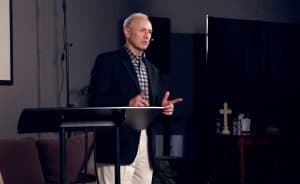 It is hard to imagine anything in religion more repugnant to people than the wrath of God, and it is easy to see why.…
It is hard to imagine anything in religion more repugnant to people than the wrath of God, and it is easy to see why.…
[For one thing, t]he notion of a “vengeful” God strikes us as inconsistent with a God of love. This seems right at first, but the complaint is based on a misunderstanding. God’s love is not a thing in itself, so to speak, but is tied, like all of his attributes, to his goodness, the very goodness we are inclined to question when evil runs rampant. “Why doesn’t God do something?” we wonder. Yet we cry foul when we learn God will do something decisive about evil and we are the evildoers.”1
Later in his book, Koukl shows how God’s love, God’s wrath, and Jesus’ death are intertwined.
Jesus came to earth to save sinners. The statement is so common to our ears, it is easy to miss its significance. Save means to “rescue from imminent danger.” Jesus came to rescue us because we were in danger. What was the danger? What was Jesus rescuing from? Here is the answer. Jesus did not come to rescue us from our ignorance or our poverty or our oppressors or even from ourselves. Jesus came to rescue us from the Father.2

Remember, the King is angry. He is the one who is offended. He is the one who is owed. He is the Sovereign we have rebelled against, the father we have disobeyed, the friend we have betrayed. And that is a dangerous place for us to be. Jesus said, “Do not fear those who kill the body, but are unable to kill the soul, but rather fear him who is able to destroy both soul and body in hell.” Later in the Story we learn, “It is a terrifying thing to fall into the hands of the living God.”3
But we’d much rather talk about God’s love—and that’s what we do! While the Church in the 16th century made the mistake of emphasizing God’s wrath over His love (and didn’t really talk about His wrath in full accordance with biblical teaching), the church today is making the opposite mistake. We do need to talk about God’s love, but in the context of a proper emphasis on His justice and wrath.
Let’s learn a lesson from history [as well as Scripture]. Despite all the distortions of biblical truths about God for which the church in Martin Luther’s day was responsible, Luther was right to fear Him [even though we would readily admit his fears needed to be more biblically informed]. In the end, Luther benefited from this fear because God used it to help him discover the truth that ultimately set him free.
This Thanksgiving, Thank God that in His Love He Sent Jesus to Rescue Us from the Father’s Wrath
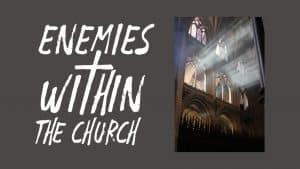 The importance of having a biblically precise view of God is a prominent theme of the new documentary Enemies Within the Church. If you haven’t watched it already, I would encourage you to make it a priority to see it soon. The film not only calls out evangelical leaders who are leading the church astray; but just as importantly, it calls on the church to sharpen her view of God, to make sure her perspective of God aligns with all the Scriptures teach.
The importance of having a biblically precise view of God is a prominent theme of the new documentary Enemies Within the Church. If you haven’t watched it already, I would encourage you to make it a priority to see it soon. The film not only calls out evangelical leaders who are leading the church astray; but just as importantly, it calls on the church to sharpen her view of God, to make sure her perspective of God aligns with all the Scriptures teach.
Yes, all forgiven sinners should bask in God’s love; but all also should keenly be aware of the fate of those who refuse to repent of their sins. Because God is holy and righteous, He must judge sin! Indeed, He cannot do otherwise and be true to His nature. Yet, as we have said, God also is love, and His love compelled Him to send His Son, Jesus, a member of the Godhead, to come to earth, live a holy life, and to be executed on a cross as a substitute for sinners, to pay the eternal penalty for their sins.

As Greg Koukl so eloquently states, Jesus took the wrath of the Father for us, and in so doing, He shields us from that wrath! But know this! Protection from divine judgment is not automatic. God does not force salvation on anyone. Instead, He offers it to all. Our response should be to run to God and meet His conditions of repentance of sins and putting faith in Christ as the only way to God.

Under the protective shadow of the cross of Christ, we stand in awe of God’s infinite mercy and grace, but we also stand in awe of His absolute holiness. And we necessarily carry a sense of urgency to warn others that God’s unmitigated wrath will come upon them if they haven’t turned from their sins to trust Christ for salvation.
Under the protective shadow of the cross of Christ, we stand in awe of God’s infinite mercy and grace, but we also stand in awe of His absolute holiness. And we necessarily carry a sense of urgency to warn others that God’s unmitigated wrath will come upon them if they haven’t turned from their sins to trust Christ for salvation.
Bow in Thanksgiving!
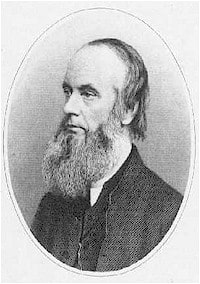
What does this have to do with Thanksgiving? Plenty! This Thanksgiving, hear and reflect on the hymn “Come, Ye Thankful People, Come.” The lyrics were penned by Henry Alford (1810-1871), “an English churchman, theologian, textual critic, scholar, poet, hymnodist, and writer.”
First published in 1844, “Come, Ye Thankful People, Come” presents a precise view of God as both loving and holy, as both a gracious Shepherd and a firm Judge. It showcases the reality of the destinies of both the saved and the lost; and it does so forthrightly, without implying the saved have anything to brag about, and without indicating the lost have any reason to blame God for their fate. Alford draws from the imagery Jesus presented in His parable of the wheat and the tares (see Matt. 13:24–30,36-43).
Of course, as we have indicated, the appropriate responses for those who know Christ are gratitude for both earthly and heavenly blessings and recommitting themselves to warning and winning the lost.

The following recording is available for download here.

Come, ye thankful people, come,
Raise the song of harvest home;
All is safely gathered in,
Ere the winter storms begin;
God our Maker doth provide
For our wants to be supplied;
Come to God’s own temple, come,
Raise the song of harvest home.
All the world is God’s own field,
Fruit unto His praise to yield;
Wheat and tares together sown,
Unto joy or sorrow grown;
First the blade, and then the ear,
Then the full corn shall appear:
Lord of harvest, grant that we
Wholesome grain and pure may be.
For the Lord our God shall come,
And shall take His harvest home;
From His field shall in that day
All offenses purge away;
Give His angels charge at last
In the fire the tares to cast;
But the fruitful ears to store
In His garner evermore.
Even so, Lord, quickly come,
Bring Thy final harvest home;
Gather Thou Thy people in,
Free from sorrow, free from sin,
There, forever purified,
In Thy garner to abide;
Come, with all Thine angels come,
Raise the glorious harvest home.
This Thanksgiving, when you sharpen your view of God, your gratitude to Him will be refined and renewed, as well.
Copyright © 2021 by B. Nathaniel Sullivan. All rights reserved.
Notes:
1Gregory Koukl, The Story of Reality: How the World Began, How It Ends, and Everything Important that Happens in Between, (Grand Rapids: Zondervan, 2017), 97.
2At this point, Koukl provides this clarification in a footnote: “Jesus saves us from the Father, but His intention is not at odds with the Father since it was the Father who out of love, sent Jesus to rescue the world in the first place.”
3Koukl, 117. Scripture quotations are from Matthew 10:28 and Hebrews 10:31, respectively, New American Standard Bible.
Unless otherwise indicated, Scripture has been taken from the New King James Version®. Copyright © 1982 by Thomas Nelson, Inc. Used by permission. All rights reserved.
Some Scriptures are taken from the NEW AMERICAN STANDARD BIBLE®, Copyright © 1960,1962,1963,1968,1971,1972,1973,1975,1977,1995 by The Lockman Foundation. Used by permission. These passages are so designated.
top image credit: Photo by Erik Witsoe on Unsplash

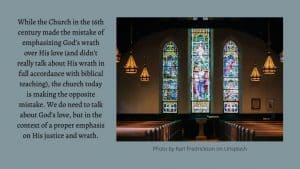
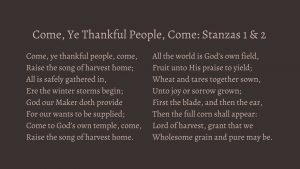
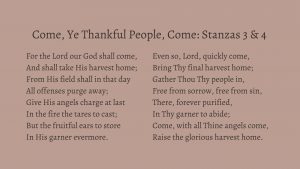
Be First to Comment